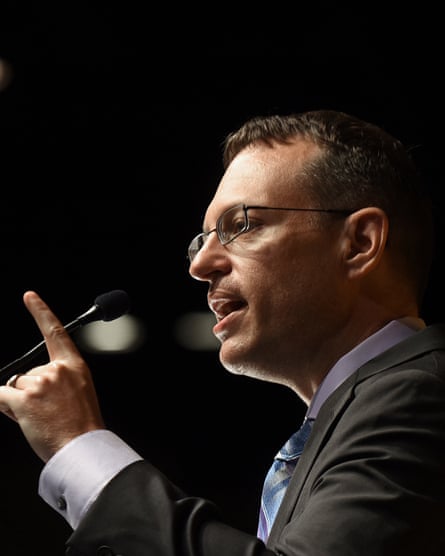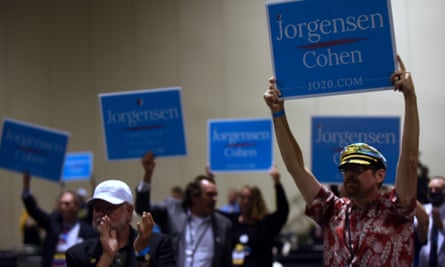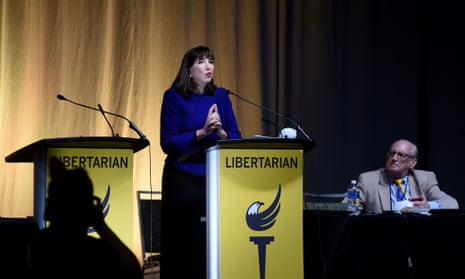The Libertarian party nominated two respected former state governors for president and vice-president in 2016, and enjoyed its most successful election performance ever, winning nearly 4.5m votes.
To many, it seemed that the Libertarians were a genuinely relevant third party in US politics, which is overwhelmingly dominated by Republicans and Democrats. But in 2020, the party, which advocates for small government and civil liberties, has gone in a wildly different direction.
The Libertarian vice-presidential candidate this November is an internet talkshow host who ran for office alongside a man wearing a boot on his head, and who has promised the electorate free ponies, “zombie power” and the killing of baby Hitler.
Spike Cohen, who narrowly won the nomination at the party’s virtual convention in May, will team up with Jo Jorgensen, a university lecturer and lifelong Libertarian who has spent years as a loyal party advocate – and who is said to have expressed a preference for a more traditional running mate.

The party’s method of choosing candidates – each is voted for independently by party delegates – allowed for the seeming extreme mismatch.
The candidates have seemingly got on with the job, holding separate bus tours around the country, but their stated goals in office could hardly be more different.
Cohen originally ran for the Libertarian vice-president post alongside the presidential candidate Vermin Supreme, a longtime political activist best known for turning up at protests or presidential primaries while wearing a rubber boot on his head.
During the campaign Cohen’s promises to the electorate were unusual. His 14-point platform included a Waffle House on every corner, “legalizing recreational plutonium” and developing “bullets that instead of harming you do helpful things like clearing up headaches and relieving nasal congestion”.
“Impeaching every member of the supreme court and replacing them with a janitor, his name is Reginald, and he will be our king,” Cohen said in a YouTube broadcast in December.
“You’re probably thinking: ‘What do you need a king for if we have a president and vice-president?’ But the thing is we’re gonna be time-traveling a lot and you know we’re not gonna be here all the time.
“You know, we’re gonna be out killing lots of babies that eventually become tyrants. We go back in time and make right what once went wrong. We’re not gonna have time to be here doing a bunch of stuff.”
After winning the nomination at a virtual convention in May, Cohen said his campaign with Supreme had been “fun satire to bring people in”, which contradicts what he told ABC15News in January.
The Jorgensen-Cohen campaign did not respond to requests for an interview.
Jorgensen, a Libertarian party member for more than two decades who was the party’s vice-presidential nominee in 1996 and who reportedly said she would vote for Cohen’s rival John Monds for vice-president, ran a more traditional campaign.
“If elected president,” Jorgensen said at the South Carolina Libertarian party convention in November: “I would turn America into one giant Switzerland, armed and neutral, but enough forces to protect and defend American soil.”
The Jorgensen-Cohen ticket comes after the Libertarian party won 3.3% of the vote in 2016, the party’s best ever performance.

Gary Johnson, a former Republican governor of New Mexico, who was also the Libertarian candidate in 2012, was the presidential candidate in 2016. His running mate was William Weld, a former Republican governor of Massachusetts who this year challenged Donald Trump for the Republican nomination.
Despite the promising electoral performance, Weld, in particular, was criticized by some party members as being “Republican lite”, which could have prompted the change of strategy this year.
While Cohen may have distanced himself from his promises of ponies, time travel and kings, however, some of his and Jorgensen’s choices as Libertarian candidates could still serve as a turn-off to voters.
In July the Guardian reported that Jorgensen had appeared on a podcast associated with the anti-government “boogaloo” movement. One of the interviewers runs a Facebook page laden with memes that appear to invoke white nationalism.
This month, the party involved itself once again with the boogaloo movement, when Cohen spoke at a gun rights rally co-hosted by a self-described “boogaloo boy” in Richmond, Virginia. Cohen used his speech to argue relaxing gun laws could end police violence.
“If you want to have your gun rights defended, if you want to have an end to police brutality because people have more guns,” Cohen said at the rally.
In a country dominated by Republicans and Democrats, there is evidence that Americans want a third option.
A 2018 Gallup poll found 57% of Americans believe a third major political party is needed – a belief that has more or less held steady for the past 10 years.
Whether Cohen’s promises of ponies and zombies and time travel fill that need remains to be seen.
